Love Note to and Mourning for Asian American Atlanta
This essay was published initially on Tropics of Meta. It has been revised, slightly, here.
In the early hours of Wednesday morning, I am woken to the harsh realities amidst the discourse of American Dreams and American democracy. Shook to the bone. Thoughts uncontained. Fear for so many friends and family in Atlanta and New York City.
Eight people were murdered in my hometown of Atlanta. Six of those eight were Asian American women. These six Asian American women were employed at various massage parlors throughout Atlanta. Xiaojie Yan. Daoyou Feng. Soon Chung Park. Hyun Jung Grant. Suncha Kim. Yong Ae Yue. Say her name. Classify their deaths as hate crimes. Support Asian America. Delaina Ashley Yaun. Paul Andre Michels. Say their names.
These attacks were coordinated attacks against Asian American women. The first attack was at the Young’s Asian Massage parlor near Woodstock and then was followed by killings at Gold Massage Spa and Aroma Therapy Spa in Atlanta. This attack and killing of Asian American women are signs of the racial landscape of the U.S. in general and of Atlanta in particular.
Figure 1. Dual-language billboard in Vietnamese and Spanish, Doraville, Ga. Photograph by Matthew Gordon Lasner, 2011.
Eight people who belonged, mattered, and meant so much to their communities, their neighborhoods, and their families, taken in an instant of white male violence against Asian Americans. Anti-Asian racism. The fact that this happened in north Atlanta and in the northern suburbs of Atlanta is not surprising. During my research on Asian American communities, for my book Desi Hoop Dreams, I got to know the different migration and resettlement stories of Asian Americans in Atlanta. Asians arrived in Atlanta at different historical moments. Although there were Asians in the U.S. South in the late 1800s and early 1900s, especially in Atlanta, it is after the passage of the 1965 Hart-Celler Act that the United States opened its borders to professionals from Asia, and that we see an increase in Asian migration to Atlanta.[1] These post-1965 communities consisted of highly-trained, highly-educated professionals who quickly settled into the suburbs of Atlanta, especially the northern Atlanta suburbs.
When the family preference act and refugee passage act were passed in the 1980s, families, not with the same social capital and education, joined their extended families in Atlanta while refugee Asian communities arrived in Atlanta. Like the earlier group, they were able to access loans and had the infrastructures of support to move immediately into Atlanta’s suburbs on both the northern and southern ends of Atlanta. For example, Clarkston, Georgia, is one of the densest and refugee-populated towns/suburbs in the United States.
“Asian American women . . . dominate various service industries throughout metro Atlanta and constitute a vulnerable labor base that is also subject to forms of racist, misogynistic, sexist violence.”
Asian families were able to move into white suburbs and affluent white counties, such as Gwinnett County (which is one of the fastest growing Asian American communities in the United States), that had resolutely kept Black Americans out.[2] Asian American communities were staunchly situated in the suburbs of Atlanta. Forming communities in the suburbs was often considered an entrée into the benefits and wages of whiteness.[3] These were white suburbs that kept Black communities out, such as the town of Woodstock thirty miles northwest of Atlanta where the identified killer, Robert Aaron Long, lived and also the site of the first attack on Asian American women.
Figure 2. Ranch 99 Market, part of a Taiwanese-owned chain based in Southern California, Doraville, Ga. Photograph by Matthew Gordon Lasner, 2010.
I noticed that this entrée into white suburbs and into the landscape of whiteness did not provide full citizenship, rights, and life. There were many racial stereotypes and racial epithets aimed at Asian American men as never man enough and never American enough. This existed alongside the hyper-sexualization of Asian American women that voided them of any of their complexities, struggles, hopes, dreams, and desires.[4] At least since the Page Act of 1875, Asian women, and specifically Chinese women, have been stereotyped as prostitutes and sites of sexual desire, a view that continues to play out in everyday caricatures of Asian American women in the contemporary moment. There are generally few stories written in Atlanta by the various media outlets that covered holistically the lives of Asian American women. Asian American men and women were recognized in Atlanta often only for their labor and as commodities, with little room to address their everyday experiences of racism.
Two of the women killed were Korean American women who worked and lived in the spas. For working-class and working-poor Korean American women, such employment already made their lives precarious. In fact, Asian American women of various ethnic and national backgrounds dominate various service industries throughout metro Atlanta and constitute a vulnerable labor base that is also subject to forms of racist, misogynistic, sexist violence. I noticed their labor in nail salons, threading salons, massage parlors, and mall kiosks, regardless of the demographics of the local neighborhood.[5] My love note to Atlanta’s Asian America is a note that challenges the discourse of the American Dream and illuminates how Asian American communities been pivotal to the building of Atlanta’s economy and cultural practices even as they have existed on unstable racial terrain.[6]
Figure 3. Le Salon spa at the multiethnic Asian Square shopping center, Doraville, Ga. Photograph by Matthew Gordon Lasner, 2010.
This violent, genocidal act by Robert Aaron Long is not exceptional. Hate crimes against Asian Americans spiked by 150 percent over the last year and New York Police Department reported 1,900 percent increase in violence targeting Asian Americans, especially with former President Donald Trump’s classification of COVID-19 as the “Chinese virus” and “Kung flu.”[7] And while it is easy to make this a case of lunatic white men attacking Asian American women and elders, there is a long history of state violence in Atlanta. One needs to look no further than “Operation Meth Merchant,” which after 9/11/2001 disproportionately imprisoned South Asian convenience store and gas station owners. ICE and Homeland Security have built a stronghold in the U.S. South during the course of my research with an increasing presence and surveillance of mosques, mandirs, and gurudwaras.
Figure 4. Patel Plaza, Decatur, Ga. Photograph by Matthew Gordon Lasner, 2011.
Accordingly, there is a prison that now houses mostly Asian American and Latinx immigrants, migrants, and refugees. The Corrections Corporation of America has established, through state subsidies, the Stewart Detention Center in Lumpkin, Georgia, where many Asian Americans, especially working-class Asian Americans, are imprisoned with minimal rights.[8]
“We need now more than ever to create communities of love . . . where we are no longer just commodities and labor.”
Atlanta. I love you. We, as Asian Americans, have made you and continue to make you. We, as people of color, have made you and continue to make you. We, as women of color, have made you and continue to make you. Stacey Yvonne Abrams. Outkast. India Arie. Indigo Girls. Asian Ballers League. Tony Atkins. Dirty South. Hines Ward. Hank Aaron. Teresa Edwards. Xiaojie Yan. Daoyou Feng. Soon Chung Park. Hyun Jung Grant. Suncha Kim. Yong Ae Yue.
During my research, I was blown away by the love between Asian American men and our allies on the basketball court. With our own ethnic politics and our racial politics that sometimes divided us, we come from all quadrants of Atlanta’s suburbs to affirm, embrace, and cherish each other on the basketball court with every crossover, blind pass, blocked shot, and dunk. It was a space where we could affirm ourselves to a humanity and to pleasures not available in other realms.
Figure 5. The Asian American retail and service landscape in Atlanta: Asian Square shopping center. Photograph by Matthew Gordon Lasner, 2010.
I love you Asian American Atlanta. Your lives, your complexities, your histories, your desires, and your pleasures matter. As the violence against us by individuals and by institutions is at the cross-roads of race, gender, sexuality, class, and ethnicity, we need now more than ever to create communities of love that can affirm us across all modalities where we are no longer just commodities and labor, rather right-bearing humans in a contentious racial terrain. We need pan-ethnic, multi-racial, and gender and sexual-equity-based solidarities to create spaces for us and for so many others. Stop anti-Asian racism. Black Lives Matter. Trans Lives Matter. No Dakota Pipeline. No Children in Cages. Dreamers Matter. I love you Atlanta, and I cry and mourn with you.
Atlanta is home. Home is home. Home is home, even when we are scared to leave our houses. We will continue to work for social justice in the most expansive way so that we can claim our present and future that can free us all from racist violence at the intersections of whiteness, misogyny, indigenous dispossession, homophobia, classism, xenophobia, and ableism. I love you Atlanta.
Notes
[1] Leslie Bow, Partly Colored: Asian Americans and Racial Anomaly in the Segregated South (New York: New York University Press, 2010); Vivek Bald, Bengali Harlem and the Lost Histories of South Asian America (Cambridge, Mass.: Harvard University Press, 2013); Sarah M.A. Gualtieri, Between Arab and White: Race and Ethnicity in the Early Syrian American Diaspora (Berkeley: University of California Press, 2009).
[2] Kevin Kruse, White Flight: Atlanta and the Making of Modern Conservatism (Princeton, N.J.: Princeton University Press, 2005).
[3] David Roediger, The Wages of Whiteness: Race and the Making of the American Working Class (New York: Verso, 1991).
[4] Ailsa Chang, “For Asian American Women Misogyny and Racism Are Inseparable, Sociologist Says,” NPR, 8-min. broadcast, March 19, 2021; May Jeong, “The Deep American Roots of the Atlanta Shootings,” New York Times, March 19, 2021; Kimberly Kay Hoang, “How the History of Spas and Sex Work Fits into the Conversation about the Atlanta Shootings,” VOX, March 18, 2021.
[5] Miliann Kang, The Managed Hand: Race, Gender, and the Body in the Beauty Service Work (Berkeley: University of California Press, 2010); for work on threading, see the scholarship of Hareem Khan.
[6] Jennifer Ann Ho, Racial Ambiguity in Asian American Culture (New Brunswick, N.J.: Rutgers University Press, 2015).
[7] Center for the Study of Hate and Extremism, California State University, San Bernardino, “Fact Sheet: Anti-Asian Prejudice, 2020,” March 2, 2020. See also, Asian American Research Institute, City University of New York, “AAARI’s Leadership Speaks Out Against Anti-Asian Hate,” March 2020.
[8] Soo Ah Kwon, Uncivil Youth: Race, Activism, and Affirmative Governmentality (Durham, N.C.: Duke University Press, 2013).










